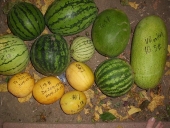
 11
11




row row row your boat, gently down the stream
merrily merrily merrily, merrily, life is but a dream.
 6
6




Check out Redhawk's soil series: https://permies.com/wiki/redhawk-soil
 5
5




James Bradford wrote:I'm super interested in coming up with a potting soil recipe where I can produce plants popping out of their pots ...like the ones hopped up on nitrogen in your local nursery. Sooo ... anybody with tips on that, hit me up, please!!
 7
7




John Suavecito wrote:
If you add biochar before inoculating it and then add compost, research has shown a delay in plant growth. The biochar sucks in the nutrition from everything around it for a couple of years until it achieves a homeostasis. Compost is a great way to inoculate biochar, but it takes time. If you want to inoculate quickly, I recommend liquid inoculation. I would add biochar after inoculation.
My two cents,
John S
PDX OR
 7
7




 3
3




Passionate researcher and hands-on gardener
Visit my blog: for Sustainable Gardening Tips
 5
5




row row row your boat, gently down the stream
merrily merrily merrily, merrily, life is but a dream.
 4
4




This is all just my opinion based on a flawed memory

 5
5




row row row your boat, gently down the stream
merrily merrily merrily, merrily, life is but a dream.
 5
5




Mike Farmer wrote:It's an interesting thought. We all know "raw" biochar will take up nutrients, which can be bad in the short term...but IF additional nutrients are added at the same time, and biochar takes up the nutrients fairly quickly, perhaps a pre-inoculation isn't that necessary. This is likely especially true if you're growing something that take longer to grow. Trees, good, lettuce bad?
https://againfarmstead.com/ | @againandagainfarmstead
 3
3




Check out Redhawk's soil series: https://permies.com/wiki/redhawk-soil
 2
2




E Sager wrote:
Mike Farmer wrote:
For potted plants, I recommend adding worm castings that have been recently harvested (<2 months). Fresher the better. Biochar + worm castings = beaucoup potted plant growth.
Thanks! My mom has been watering with a compost tea she makes from poultry manure and I'm super jealous of her results with that. Chickens are really hard to keep alive tho on these startup sites I'm doing ...lot's of predators. I guess setting up some worm casting bins is my next "todo".
row row row your boat, gently down the stream
merrily merrily merrily, merrily, life is but a dream.
 3
3








Zone 6, 45 inches precipitation, hard clay soil




 4
4




May Lotito wrote:Do you have strawberry planted in soil mix without char for comparison?
row row row your boat, gently down the stream
merrily merrily merrily, merrily, life is but a dream.
 2
2




row row row your boat, gently down the stream
merrily merrily merrily, merrily, life is but a dream.
 7
7




row row row your boat, gently down the stream
merrily merrily merrily, merrily, life is but a dream.
 3
3




row row row your boat, gently down the stream
merrily merrily merrily, merrily, life is but a dream.
 2
2




Check out Redhawk's soil series: https://permies.com/wiki/redhawk-soil
 7
7




row row row your boat, gently down the stream
merrily merrily merrily, merrily, life is but a dream.
 4
4




row row row your boat, gently down the stream
merrily merrily merrily, merrily, life is but a dream.
 3
3




James Bradford wrote:Ive been cranking up the biochar/compost ratio up as high as 50/50, but now im going back down. Im starting to see some yelow leaves now that plants are actively growing.
Interesting to note, my phMeter shows way acidic 4 to 5ish in the hi-biochar mix. I dont believe it, i think it is a misread due to increased conductivity from the graphite.
Im gonna plant some blueberries in it just to see how they do. We cant normally grow blueberries in central tx due to soil ph 7.5 to 8
Check out Redhawk's soil series: https://permies.com/wiki/redhawk-soil
 4
4




 4
4




Check out Redhawk's soil series: https://permies.com/wiki/redhawk-soil
 5
5




Zone 6, 45 inches precipitation, hard clay soil




 2
2




row row row your boat, gently down the stream
merrily merrily merrily, merrily, life is but a dream.
 4
4




row row row your boat, gently down the stream
merrily merrily merrily, merrily, life is but a dream.
 7
7




row row row your boat, gently down the stream
merrily merrily merrily, merrily, life is but a dream.
 2
2




row row row your boat, gently down the stream
merrily merrily merrily, merrily, life is but a dream.

|
We can fix it! We just need some baling wire, some WD-40, a bit of duct tape and this tiny ad:
The new purple deck of permaculture playing cards
https://www.kickstarter.com/projects/paulwheaton/garden-cards
|





